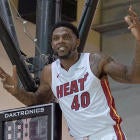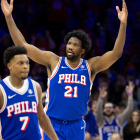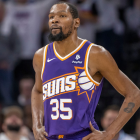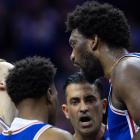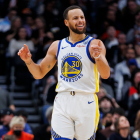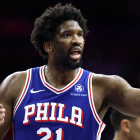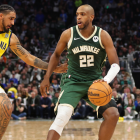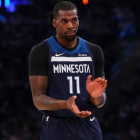Don't tell Udonis Haslem that the Miami Heat are just running it back with a 44-win team. The veteran knows that they were expected to make personnel moves in the summer and feels they are being underestimated because they didn't. He also feels they are a top-four team in the East, without a Jimmy Butler trade.
"We're not coming with the same team," Haslem told CBS Sports. "We're just coming with the same names on our roster. These guys have developed."
On the phone, Haslem, 38, rattled off the names of their young players -- Josh Richardson, Bam Adebayo, Justise Winslow, Rodney McGruder, Derrick Jones Jr. -- and asserted that every single one of them has meaningfully improved. Having seen Miami teams prove people wrong before, he expects that this group will earn more respect as the season goes on.
"One of the things that the Miami Heat does more than any other organization is we find diamonds in the rough and we develop that talent and we turn these guys into legit, solid NBA players," Haslem said.
Haslem, of course, is the franchise's all-time diamond in the rough. Undrafted in 2002, he played in France for a year and signed with his hometown team the following summer. He is now entering his 16th straight season with the Heat, a three-time champion and a fan favorite forever. He can tell you as well as anybody what they stand for -- or you could just watch what happens when Miami runs into some tired team on some random night in the middle of the regular season.
"You can always tell when teams step out and they're mentally or physically beat and they don't want to compete," Haslem said. "We're going to compete every night. That's part of Heat culture. We hold each other to that standard. We're not afraid to have those uncomfortable conversations with one another. If somebody's not bringing it, we're going to let you know that you're not bringing it. That's also part of Heat culture: we pride ourselves of being the hardest-working and the most disliked, nastiest team in the NBA."
This conversation has been edited and condensed for clarity and flow.
CBS Sports: There's been so much noise on the Jimmy front, and this isn't your first experience with rumors hanging over a team. Do you consider it part of your job to talk to guys about this stuff and keep them focused?
Udonis Haslem: Only if I feel the need to. Only if I see that there's a guy that can be disturbed by trade rumors, that's not giving his best effort or not being himself because of the trade rumors that might be surrounding that particular player. But we haven't had any of that. Our guys have stayed engaged. Our guys have stayed in touch. Guys have continued to focus on the team and the things that they're trying to improve.
CBS: It's hilarious if you go back and read the scouting reports on Bam coming out of college -- now he's going coast to coast, making all these plays as a passer. What has impressed you most about him?
UD: His work ethic. His maturity level for a kid his age. And, yes, he's very highly skilled. I'll be the first to tell you, speaking from experience, that so-called experts don't know half of what they think they know. So whatever the scouting report on Bam, you can't measure someone's work ethic, you can't measure someone's determination, and when people put in their work behind the scenes when the lights are off and nobody's watching, you can't put a cap on what type of player somebody's capable of being.
CBS: How have you seen Josh develop? Do you see a different version of him this year?
UD: Yeah. Every year, Josh gets more and more comfortable and more and more confident in who he is on both ends of the floor. And I'm saying that not from a physical standpoint, 'cause he already came in with a lot of physical attributes, but just from a vocal standpoint. He's getting a lot more vocal on both ends of the floor, controlling us on offense and getting guys in their spots on defense, holding guys accountable and being vocal. The sky is the limit for Josh Richardson because he has all the talent in the world. He's long, he's athletic, he has the ability to play both ends of the floor. Now, stepping into that leadership role, we need him to be a little bit more vocal and take control of this team. Because, at the end of the day, Dwyane [Wade] and I, our day is coming. And there has to be somebody else that has to uphold the standards and continue to make sure the Heat culture regenerates through the organization and to the locker room.
CBS: What's your definition of Heat culture?
UD: Selfless. Hard-working. Heat culture guys are a little rough a round the edges. You gotta have a chip on your shoulder. You're not out there to be liked. We're out there to get better, man -- the Heat culture is all about family, all about being selfless, all about pushing each other to the next level to be the best you can possibly be. And at the end of the day, we're not looking for approval from nobody else outside our organization.
CBS: Some guys can't accept smaller roles and their ego gets in the way of them mentoring younger guys. When Erik Spoelstra told you he wanted that from you, how did you get to a place where you embraced it?
UD: It wasn't easy. It's a lot of dark nights. A lot of soul-searching and a lot of thinking. A lot of praying and just figuring it out. Most of the guys, when you've been with an organization as long as I've been with the Miami Heat, if you're going to continue to get playing time and stay in the rotation, a lot of guys end up having to go somewhere else. If you look at all the guys that have been in the league and have played as long as me, you know, Vince [Carter] has been on a few teams; you see Tony Parker, his first time going somewhere else to play; you see David West played a couple different places before he retired. Most of the time, veterans don't get to stay with the organization that drafted them or gave them their first opportunity. As they get toward the end of their career, they're looking for more playing time, the organization is at a crossroads, moving on with younger players.
I had the opportunity to make that decision to move on, but for me, this is my home. My family is here. This organization is the first organization to give me an opportunity, and I know people say you can always come back, but I just felt like it wouldn't have been the same. I always made the decision to sacrifice my personal feelings, my personal well-being for what I thought was the best decision to make for my team, for my family, for my organization and for myself.
CBS: I imagine you can't put a price on the stature you have with the organization, the connection you have with fans. Does it feel like, by staying, you have something that the vast majority of NBA players will never have?
UD: I definitely think it was the best decision. I definitely think that, in the long run, it'll serve me better to stay and sacrifice and to focus on something bigger than myself. Some people will say he can't play, why he's still here? Some people will say he can still play, he chose to be here and he's making a sacrifice -- those are the people who I really value, the people who see the sacrifice it takes. Because it's easy to say you need to sacrifice, the team is the most important thing, until you're the guy that actually has to be the one that sacrifices, until you're the guy that actually has to put the team first.
CBS: When did you first talk with Dwyane about potentially retiring at the same time?
UD: When we won our second championship. We looked at our accomplishments and our journey and we were were saying, "Man, it's been a great ride, we should finish it together." We've accomplished a lot of amazing things together.
CBS: It's obviously deeper than basketball with him -- can you describe what the bond is like after all the time you've spent together?
UD: We're family now. We're family. He's invested in my life outside of basketball more so than he is in basketball, and I'm invested in his life outside of basketball more so than in basketball. We consider ourselves to be brothers. Our wives are close. Our kids are close. We just value each other on a whole 'nother level.
CBS: Gregg Popovich is now the only coach who has been with his team longer than Spo. Since you've seen his rise up close, is that kind of crazy to you?
UD: That is crazy. I've been with him along the journey, the whole time, when he was the assistant coach working on player development with guys to taking a bigger role as an assistant coach, and then now the head coach. And I've just seen him mature and I've seen him develop. One thing about Spo is he's not afraid to evolve. He's changed in a lot of ways for the better, and we appreciate that as players. That allows us as players to become vulnerable and make changes as well when you see the coach do it.
CBS: Every once in a while, whether it's KD leaving the Thunder or the Isaiah Thomas trade or the DeMar DeRozan trade this summer, people start talking about the idea of loyalty in the NBA. What does the word "loyalty" mean to you in the context of professional basketball?
UD: Oh, man. It's tough. It's tough, it's tough, it's tough, you know? I feel like in this day and age, loyalty is rare. To be honest, every situation is not like this situation that I have, believing in this organization. So I would advise players to do what's best for them. What's best for me might not be what's best for another player in another situation or another organization. You have to take all that into consideration because you do look at the DeRozan situation and you do look at guys that have been with organizations for a long time and consider themselves lifers, consider themselves franchise guys that will be there forever, and then you pick up the paper one day and they're gone.
My decision I made wasn't easy. It took a lot of sacrifice and it still takes sacrifice to sit on the bench and be a mentor, knowing that you still have something to give and knowing that you can still play this game at another level. You know that once you walk away, there's no coming back, so the last thing you want to have is regret. That's something I just live with every day, man. Every day, I live with the fact that this was a decision that I made and I can still impact these guys whether I'm playing or not. That's been my focus. I challenge myself every day to impact these guys. I challenge myself every day to bring a smile and energy to these guys and make sure I have a smile on my face and make sure that these guys don't see me with my head down, pouting, being selfish about my playing time or being selfish about not getting the minutes. I need these guys to see me being selfless, I need these guys to see me being engaged, I need these guys to see me working hard and I need these guys to see that championship DNA and that Heat culture inside of me coming out every day. And that's what I focus on every day, whether I'm playing or not.













